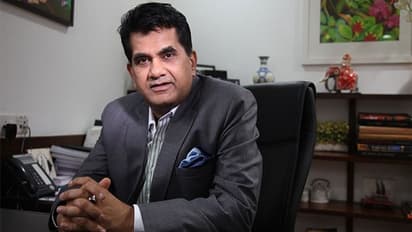India tops global digital payments: Amitabh Kant lauds 50% share

Synopsis
Amitabh Kant highlights India's leadership in digital payments, accounting for 50% of global transactions. He credits India's open-source digital infrastructure and startup ecosystem for driving innovation and rapid economic growth.
India now accounts for half of all global online transactions, said Amitabh Kant, India’s G20 Sherpa, on the opening day of the Rising Bharat Summit 2025. He attributed this change to innovation and quick digital payments. According to Kant, "India leads the world in fast payments. 50% of all digital transactions worldwide are handled by us. China follows with 20%." He emphasized the swift economic growth of India. He credited India’s open-source, interoperable digital stack for enabling competition and innovation among private players like PhonePe, Google Pay, Paytm and Amazon Pay.
Kant pointed out that India is the only country where payment history is used to offer credit, and where insurance and stock market transactions can be completed in under a minute. “We do fast payments, credit, stock market investments, and insurance—often in just 30 seconds. No other country is doing this at such a scale,” he said.
“A decade ago, we were part of the fragile five economies. Today, we are among the top five,” he noted. Kant also cited advancements in technology and infrastructure. He stated, "India has made remarkable progress in building digital and physical infrastructure."
According to Kant, there has been a significant change in India's IT sector regarding the start-up environment. “Back in 2016, India had just 156 startups. Today, we have over 1.61 lakh startups and around 150 unicorns. Young entrepreneurs are driving innovation across sectors, from electric mobility and logistics to health and education,” Kant said.
"With more than 100 unicorns, there are currently around 1,61,000," he continued. He called the work being done by Indian start-ups in the fields of artificial intelligence and healthcare "path-breaking."
Also Read | India's smartphone exports hit record Rs 2 lakh crore, iPhones lead surge
Stay updated with all the latest Business News, including market trends, Share Market News, stock updates, taxation, IPOs, banking, finance, real estate, savings, and investments. Track daily Gold Price changes, updates on DA Hike, and the latest developments on the 8th Pay Commission. Get in-depth analysis, expert opinions, and real-time updates to make informed financial decisions. Download the Asianet News Official App from the Android Play Store and iPhone App Store to stay ahead in business.